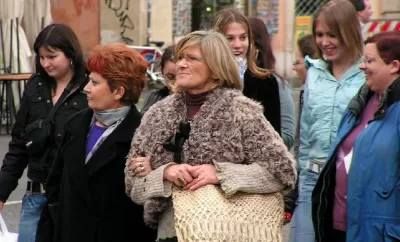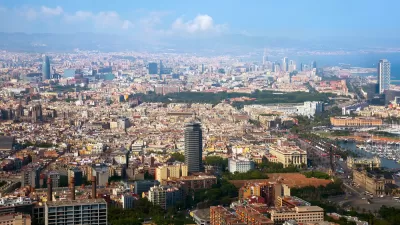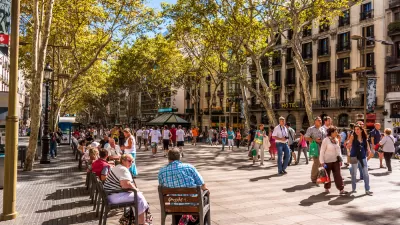Cities are built by men, and so too often urban design does not reflect the needs, perspectives, and realities of women.

"Cities are supposed to be built for all of us, but they aren't built by all of us," says Stephanie Hegarty in a BBC video report. She talks to members of Col·lectiu Punt 6, a feminist collective of urban designers in Barcelona, about how cities can better serve women and the innovative projects happening in the city.
For example, women use public restrooms more often and for longer periods of time than men, and they often need to bring in strollers. And men can stand while women need stalls, meaning that women’s restroom spaces should be larger. Hegarty also looks at how public spaces, like playgrounds, are segregated and ways design can better integrate these places.
Punt 6 and Janet Sanz, Barcelona’s Deputy Mayor for Urbanism, also advocate for more accessible transportation spaces and less car-centric urban design. Barcelona has developed a series of innovative superblocks, areas where nine smaller blocks are combined to create a larger network of streets that support biking, pedestrians, and public spaces and where car use is limited. Women in Barcelona have also expressed an overwhelming desire for more benches, and the city has installed hundreds of them in neighborhoods, along with trees and more greenspace.
Barcelona is also known as a party town where women do not always feel comfortable and safe. "Now the city is saying no to sleaze with these anti-machismo stands," notes Hegarty. Women can go to the stands to get more information about resources and a new app that the city has put out to report incidents of sexual harassment or violence.
"Seeing what a city built by women would look like is still just a fantasy. But these women are giving a glimpse of what that future could be," concludes Hegarty.
FULL STORY: What would a city designed by women be like?

Alabama: Trump Terminates Settlements for Black Communities Harmed By Raw Sewage
Trump deemed the landmark civil rights agreement “illegal DEI and environmental justice policy.”

Study: Maui’s Plan to Convert Vacation Rentals to Long-Term Housing Could Cause Nearly $1 Billion Economic Loss
The plan would reduce visitor accommodation by 25% resulting in 1,900 jobs lost.

Planetizen Federal Action Tracker
A weekly monitor of how Trump’s orders and actions are impacting planners and planning in America.

Wind Energy on the Rise Despite Federal Policy Reversal
The Trump administration is revoking federal support for renewable energy, but demand for new projects continues unabated.

Passengers Flock to Caltrain After Electrification
The new electric trains are running faster and more reliably, leading to strong ridership growth on the Bay Area rail system.

Texas Churches Rally Behind ‘Yes in God’s Back Yard’ Legislation
Religious leaders want the state to reduce zoning regulations to streamline leasing church-owned land to housing developers.
Urban Design for Planners 1: Software Tools
This six-course series explores essential urban design concepts using open source software and equips planners with the tools they need to participate fully in the urban design process.
Planning for Universal Design
Learn the tools for implementing Universal Design in planning regulations.
Caltrans
Smith Gee Studio
Institute for Housing and Urban Development Studies (IHS)
City of Grandview
Harvard GSD Executive Education
Toledo-Lucas County Plan Commissions
Salt Lake City
NYU Wagner Graduate School of Public Service





























